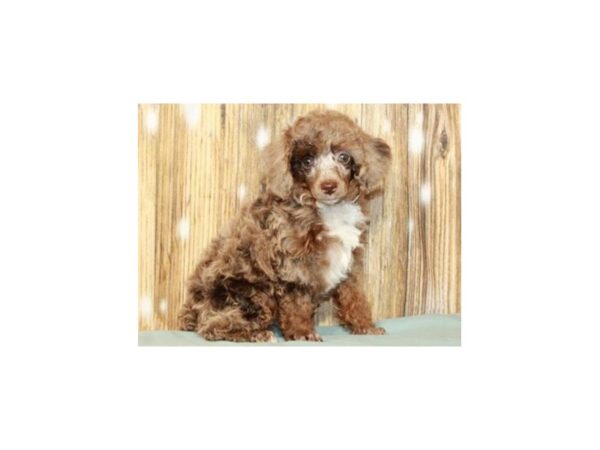Introduction
Chocolate Merle Poodle Puppies For Sale are a delightful and unique variation of the beloved poodle breed. With their striking coat patterns and playful personalities, these puppies have captured the hearts of dog lovers around the world. In this guide, we’ll explore everything you need to know about merle miniature poodle puppies, including their characteristics, care requirements, training tips, and health considerations.
Table of Contents
| Topic |
|---|
| Characteristics of Merle Miniature Poodles |
| History of the Poodle Breed |
| Understanding the Merle Coat Pattern |
| Temperament and Personality |
| Care Requirements |
| Training Your Merle Miniature Poodle |
| Socialization for Puppies |
| Health Considerations |
| Choosing a Responsible Breeder |
| Conclusion |

Characteristics of Merle Miniature Poodles
Merle miniature poodles can come in various combinations of colors, such as blue, black, and silver when combined; the pattern gives a mottled effect.
The miniature poodles are about 10 to 15 inches in height at the withers, and their weight falls between 10 to 15 pounds. The coats are curly, hence hypoallergenic; however, this feature of non-shedding coat makes them very popular for people with allergies..
History of the Poodle Breed
The origin of the poodle breed dates back to Germany and France, bred as a water retriever. There are three sizes of this breed: standard, miniature, and toy. The miniature poodle was bred to be a companion dog, and to this day, remains one of the most popular breeds due to its intelligent nature and trainability..
Understanding the Merle Coat Pattern
The merle coat pattern is a result of a certain mutation in the genes. It is a marbled appearance with both lighter and darker patches mixed into the coat. This can come in with certain breeds. In the case of a poodle, this can be a possibility as well; however, it has to be understood that not all puppies can have this merle gene, and responsible breeding always has to be conducted for the health of the puppy.
Temperament and Personality
Merle miniatures poodles are described as very warm, energetic, and generally friendly. They are efficient learners, enjoy pleasing, and thrive on training hence ideally suited to any family or individual. The puppies are good with children and respond very well to lots of diverse situations like living in a place apartment or house..

Care Requirements
- Taking care of a merle miniature poodle includes the following main elements:
1. Grooming: They have to be brushed on a regular basis to avoid matting. With the ideal brushing at least once weekly and going under the professional grooming every six to eight weeks.
2. Diet: Provide your puppy with a balanced diet prepared for small breed dogs. Discuss the recommendations with your veterinarian regarding the age, weight, and activity level of your puppy.
3: These puppies are active and require routine exercising to live an exceptionally healthy life. Daily walking and playing will be effectively considered to ensure they remain healthy and mentally alert as well.
4.Health Care: Regular veterinary check ups, vaccination, as well as all preventive measures are absolutely necessary for maintaining the health of your puppy..
Nutrition: A balanced diet is crucial for the health and well-being of merle miniature poodles. Look for high-quality dog food specifically formulated for small breeds. Consult your veterinarian for portion sizes based on your puppy’s age, weight, and activity level.
. Exercise: Merle miniature poodles are energetic and require regular physical activity. Aim for:
- Daily Walks: At least 30 minutes of walking each day.
- Playtime: Engage in interactive play, such as fetch or tug-of-war, to keep them mentally stimulated.
Training Your Merle Miniature Poodle

Training a merle miniature poodle must be started quite early, hopefully during the puppy stage. Here are some useful training tips:
•Positive Reinforcement: Reward good behavior with treats and praise. It encourages learning and strengthens the tie.
•Consistency: Use clear commands and adhere to them. In your case, consistency will make it easy for your puppy to know what is expected.
Choosing a Responsible Breeder
If you want to welcome a merle miniature poodle puppy into your family, you have to find the responsible breeder. Here are the few tips you could use for finding a well-known breeder:
Health Testing: Speak with the breeder about health clearances of the parents of the puppy, especially in common poodle problems.
Visit the Facility: If possible, visit the place of the breeder to get an idea of conditions under which puppies are raised there.
Ask questions: Inquire as to the breeding practices, socialization, and care of the puppies.
Socialization for Puppies
Socialization is very important to merle miniature poodle puppies. The sooner this is done the better, as they will become well-adjusted adults in life. Here are some ways to socialize your puppy:
• Puppy Classes: Puppy training classes can be a great opportunity for socialization and learning basic commands.
• Playdates: Schedule playdates with other vaccinated puppies and canines to let them learn good social skills.
• Public outings: Be sure to take your puppy to some of the parks, pet-friendly stores, and other public places so they can be exposed to new sights and sounds.
Appearance
1. Coat and Coloration: Merle miniature poodles stand out due to their unique coat pattern. The merle gene creates a mottled effect, resulting in a beautiful blend of colors. Common color combinations include:

- Blue Merle: A grayish base with darker blue patches.
- Chocolate Merle: A rich brown base with lighter chocolate spots.
- Black Merle: A black base with shades of gray or blue mottling.
- Red Merle: A reddish base mixed with lighter patches.
- Size: Miniature poodles typically weigh between 10 to 15 pounds and reach a height of 10 to 15 inches at the shoulder. They are compact, making them suitable for both apartments and homes with yards.
Health Considerations
- Merle miniature poodles are generally healthy dogs but may be predisposed to certain genetic disorders. Regular visits by a veterinarian or health check can ensure that their health is maintained. Some common health disorders include:
Hip Dysplasia: A genetic hip-joint disorder causing arthritis. Eye Disorders: This includes progressive retinal atrophy and cataracts that affect poodles. Epilepsy: There have been recorded instances of seizures in some poodles.
Conclusion
Merle miniature poodle puppies are special and beautiful to add to a family or any person. They have an attractive look. They are playful, intelligent animals which could bring happiness and friendship to people and families. The understanding of the needs of the animal, proper care, and choosing a responsible breeder result in your merle miniature poodle living well in a loving home.
FAQs
- What is a merle pattern?
- The merle pattern is a genetic mutation that creates a mottled coat with patches of different colors.
- Are merle poodles prone to health issues?
- While they can be healthy, merle poodles may be at risk for specific genetic conditions. Regular veterinary care is essential.
- How often should I groom my merle miniature poodle?
- Grooming should occur at least once a week, with professional grooming every 6 to 8 weeks.
- What is the ideal diet for a merle miniature poodle?
- A balanced diet formulated for small breeds is recommended. Consult your veterinarian for personalized advice.
- How much exercise do merle miniature poodles need?
- They require daily exercise, including walks and playtime, to stay healthy and happy.
- Are merle miniature poodles good with children?
- Yes, they generally have friendly and playful temperaments, making them great companions for children.
- What training methods work best for poodles?
- Positive reinforcement methods are the most effective for training poodles.
- How can I socialize my merle miniature poodle?
- Puppy classes, playdates, and public outings can help with socialization.
- What should I look for in a breeder?
- Look for health testing, good breeding practices, and a commitment to raising healthy puppies.
- What are the common colors in merle miniature poodles?
- Common colors include blue, black, and silver, often combined in unique patterns.

